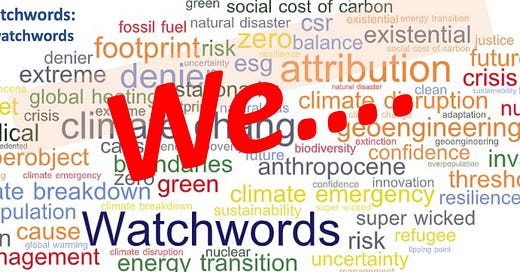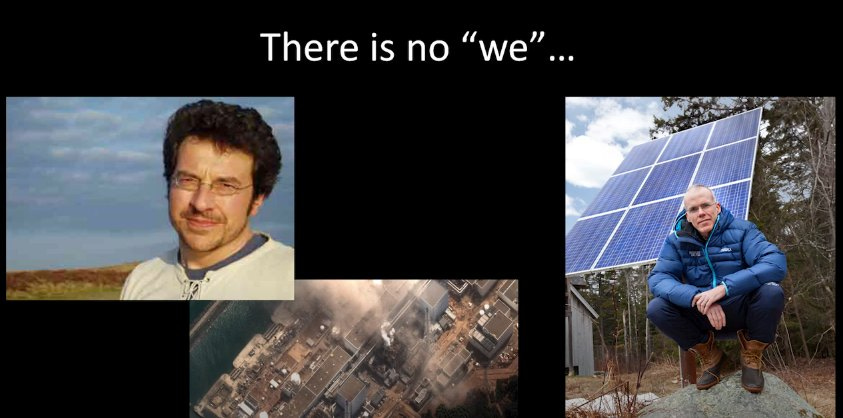Watchwords in Climate and Sustainability Debates - Who is "We"?
I'm building a discussion space for words, phrases and numbers that too often confuse, divide or harm more than clarify and connect. I need your help to make this work.
I’m building a lexicon of #watchwords - terms that confuse or divide more than clarify. Pitch your candidates in the comment thread!
Welcome to Watchwords, a series of Sustain What posts and webcasts identifying terms and phrases in climate and sustainability discourse that confuse, divide or harm more than they clarify and connect.
Much of this climate miscommunication is accidental. Different scientific disciplines, for instance, define and measure risk in different ways - and the public sees risk differently yet again.
So risk is definitely a watchword. I'll write up that entry soon.
In this fraught arena, words - too often - are also wielded intentionally as fog machines (footprint, net zero) or blunt objects (denier, doomist).
My goal here is not to police verbiage, but to build a living lexicon revealing divergent or deeper meanings through crosstalk. In most instances, this isn't a win-lose proposition. You can own your meaning of a word for which I have a different one. I'll write a landing-page Watchwords post soon with more details.
Through dialogue, when definitions are clarified, more productive discourse on solutions can be pursued even amid the revealed differences. This happens in pursuing peace as much as environmental sustainability, as this marvelous Sustain What discussion revealed.
Let's get started. Please send me your candidate watchwords via my Google Form here: What terms in climate, energy and sustainability debates deserve a closer look?
I'll prime the pump with one of the smallest, most overused, and under-assessed, words in such discourse:
We
As in "We Are Living in a Climate Emergency, and We’re Going to Say So."
This was the headline on the April 12, 2021, Scientific American post of a joint statement from a batch of my journalist friends and colleagues - at the magazine, the Covering Climate Now initiative, the Columbia Journalism Review, The Nation, The Guardian, Noticias Telemundo, Al Jazeera, Asahi Shimbun and La Republica. The initiative posted a long list of reasons for this move.
A future post will explore "climate emergency" as a watchwords focus. I feel quite strongly that saying "we are all in a climate emergency" dangerously obscures the wrenching plight of hundreds of millions of people who, through prejudice or poverty, face a vulnerability emergency that would exist even without global warming, even as those of us in the well-off world are greatly insulated from such threats. There's plenty of room for discussion of course.
But here let's focus on "we."
I probably used "we" thousands of times in talks, media appearances, stories and blog posts before I began to fully absorb how little of what I was saying represented the span of human experiences around this planet.
"We need to leave fossil fuels behind" or "we are a scourge on the Earth" are easy phrases to intone.
But it would be entirely unethical for me to think that the first statement above should apply to women I met in central India while reporting for ProPublica on the devastating health impacts of sooty pollution from cooking fires stoked with wood or other biomass. India has had a big program facilitating access to liquefied petroleum gas, LPG, better known in the U.S. as the propane tanks under countless backyard grills. Researchers have found this blue-flamed fuel actually has a lower climate impact than biomass burning in most cases and, while imperfect, is vastly better for health.
Now my sustainability slide decks always include the phrase "There is no we," particularly when it comes to energy choices and climate vulnerability:
Here's another context.
There is no "we" for worry, or for how humans react to real-time stresses or long-term risks.
“Cultural cognition”
A behavioral scientist at Yale Law School, Dan Kahan, built an entire field of study - what he calls "cultural cognition" - around how culture powerfully shapes which information people embrace or reject. His most sobering work, for me as a lifelong science communicator, revealed this unnerving reality: “Climate Science Literacy Unrelated to Public Acceptance of Human-Caused Global Warming.” [Read lots more about how this work changed my journalism focus.]
Even among those most passionate about moving past fossil fuels, there can be starkly divergent beliefs about the path ahead.
This reality was on glaring display when the 2011 tsunami badly damaged three reactors at Japan's Fukushima Daiichi nuclear power complex. The American author and climate campaigner Bill McKibben and the British columnist and campaigner George Monbiot drew completely divergent lessons from the event and laid them out in columns in The Guardian even as the disaster was playing out.
McKibben said nuclear power was too centralized and brittle to be part of the clean-energy transition. Monbiot wrote that the lack of a true catastrophe showed that nuclear energy must play a role given the momentous nature of the climate catastrophe to come.
Who's the nuclear "denier"? Where's the "we" for clean-energy pathways?
There's a solid argument that having a diversity of perspectives on tough risks, having no "we," is one of the greatest attributes of the human species.
"Response diversity" is a source of resilience in ecosystems, scientists have found. I'd propose, but can't prove, that it is a good property to nurture in society.
Let's discuss!
But it's also important to acknowledge that the "we" of folks reading my Sustain What columns is small. You're mostly here because you're eager to avoid thought bubbles. And of course you're sufficiently prosperous to afford Internet access and live somewhere with a connection.
I'm glad the digital "we" seems poised for expansion given the deal President Biden struck this week with big internet providers to offer steep discounts that could add 48 million Americans to the online world.
But there's a long way to go to overcome global digital divides.
Ultimately, yes, we are all human beings. And we are part of the great global web of life.
But let's all try to use the word more mindfully going forward.
Once again, what words should we add to this project?
More:
Two Experts Offer Personal Solution Paths Amid Complexity and Inevitability - authors Michele Wucker and Kimberly Nicholas on Sustain What
Watchwords: For Antarctic Clarity, Exploring the Meanings of Collapse
Support Sustain What
Any new column needs the help of existing readers.
Thanks for commenting below or on Facebook.
Send me feedback (including corrections!), tips, ideas here.
Find my social media accounts, books and music in a click here. And please share Sustain What with solution-focused friends and colleagues!








The function of nouns is to divide the single unified reality in to conceptual parts. We can then rearrange the conceptual parts in our minds to create visions of reality which don't yet exist. That is, we can be creative.
The price tag for this process is a significant degree of distortion, as the divisions created by nouns are only conceptual, not real. These conceptual divisions are useful but arbitrary inventions of the human mind, which leaves them open to various interpretations often resulting in confusion. The word "we" can mean a million different things depending on the context in which it is used, but as a noun it creates the illusion of having a fixed meaning.
Environmental crisis arises from this fundamental process of conceptual division, as "me" is _perceived_ to be separate from "environment". Conceptually this is true, but in the real world it's false. When does a glass of water that I drink become "me"? When does the air I breathe become "me"? We can reasonably draw these boundaries in a variety of places, which reveals the arbitrary nature of the divisions we perceive.
We are made of thought. Thought operates by a process of division. All else for the better and the worse in the human experience arises from that source.
The cultural “WE”, we the community based group, climate justice and small ngo’s, especially, in groups and in communities where there is consensus.
Us and them
Them -- racists fascist capitalist industries that have captured regulators, legislators and big NGOs